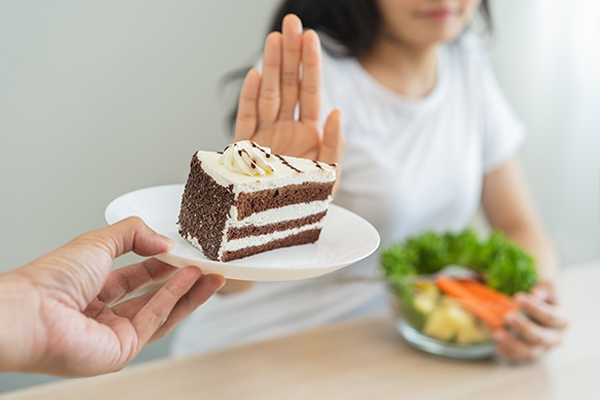Why Cutting Down on Sugar Can Change Your Life

Drinking coffee while snacking on sweet cakes has become a lifestyle for many people today. It feels like something is missing if you haven't had coffee and eaten something sweet together. Without realizing it, we are actually "spilling sugar" into our bodies.
In fact, our daily sugar requirement is approximately 50 grams, equivalent to four tablespoons. So, it is not surprising that Indonesia is ranked fifth with 19.5 million diabetics by 2021.
In fact, estimates indicate that Indonesia will have more than 20 million diabetes cases by 2024. And what is even more worrying is that the trend of diabetes in children is also increasing.
However, diabetes does not always appear just because of eating or drinking too much sweet food. There are other factors that also play a role.
For example, habits such as sleeping late at night, which can trigger insulin resistance, or rarely exercising, often include skipping breakfast. All of these habits, if left unchecked, can secretly increase the risk of diabetes.
Signs that the body is flooded with sugar

So, what are the signs that the body is beginning to flood with sugar? Let's pay attention to the following symptoms:
- Often feeling thirsty and wanting to urinate.
- Feeling hungry all the time and increasing appetite.
- Vision starts to feel blurry.
- The body gets tired and weak easily.
- The mouth feels dry because saliva production decreases.
- Skin color, especially in body folds, tends to darken.
If you experience some of the symptoms above, it could be that your body is having trouble processing the incoming sugar.
What happens when you stop eating sugar?

Cutting back on sugar, especially added sugar, can be one of the best decisions for your health. Added sugar often hides in processed foods, sweetened drinks, and our favorite snacks.
In fact, excess sugar can increase the risk of obesity, heart disease, type 2 diabetes, cognitive impairment, depression, and even some types of cancer.
Read more: Diabetes Complications.
However, that doesn't mean we have to avoid all sugar. Natural sugars in fruits, vegetables, and dairy products are still safe to consume because they contain additional nutrients, including fiber, vitamins, and minerals.
So, what will happen if we start limiting our intake of added sugar? It turns out the effects are amazing!
Benefits of reducing added sugar
1. Prevent obesity
Excessive sugar consumption can disrupt the balance of the hormone insulin, which plays a crucial role in regulating blood sugar levels and fat storage.
Without added sugar, calorie intake is reduced, making weight control easier. Replacing sweet drinks and foods with low- or no-sugar options can save hundreds of calories each day without changing the amount of food we eat.
2. Lower the risk of diabetes
High intake of added sugar is directly related to the risk of type 2 diabetes. Weight will also increase when consuming a lot of calories in the form of added sugar. Reducing sugar intake can help maintain stable blood glucose levels and enhance insulin sensitivity.
3. Stay young
Excess sugar can accelerate skin aging by forming AGEs (advanced glycation end products). AGEs damage collagen and elastin, two essential proteins that contribute to skin elasticity and firmness. Reducing sugar intake can help slow the appearance of wrinkles and maintain healthy skin.
4. Healthier body
Added sugar contributes to chronic inflammation that triggers many diseases. Reducing it can boost the immune system and help prevent degenerative diseases.
5. Reduced sweet cravings
Sugar is addictive because it triggers dopamine in the brain. However, after a few days of cutting back on sugar, those sweet cravings will subside.
That’s why it’s not uncommon to experience mild withdrawal symptoms, such as headaches, anxiety, and higher-than-usual sugar cravings, when you stop consuming sugar.
Do this for a few days, until your cravings for sweet, high-carb foods begin to decrease significantly. To minimize side effects, consider gradually reducing added sugar rather than cutting it out suddenly.
6. Control your appetite
Eating less sugar can help you regain control of your leptin hormone, which controls your hunger. You’re better able to recognize when you’re full.
However, if you’re obese and have insulin resistance, your body becomes more resistant to the signal that you’re full. Improving your glucose management can help restore your body’s leptin regulation, and reducing added sugar intake is key to achieving this.
7. More energy
Sugar provides a quick energy boost, but it can also cause a sudden energy crash. Replacing it with complex carbohydrates and fibrous foods can help you feel more energized and sleep better.
Risks of avoiding sugar too much

However, don't be too extreme. Thinking of sugar as the "enemy" can make us more tempted. And remember, the body still needs glucose for basic functions, such as thinking, moving, and maintaining mood.
If you have symptoms, such as fatigue, constant hunger, headaches, or blurred vision after eliminating sugar, it may indicate that your blood sugar levels are too low. So, the important thing is not to be 100% sugar-free, but to be wise in choosing the right source.
Tips for cutting back on added sugar
If you’re used to a sweet life, cutting back on sugar can be a challenge. But small steps can make a big difference. Try these things to start with:
- Swap sugary drinks for water.
- Add lemon slices or mint leaves for a refreshing boost.
- Eat a low-sugar breakfast with eggs, vegetables, avocado, and berries instead of sugary cereals.
- Read the food labels.
- Watch out for sauces, cereals, and packaged foods—they’re full of hidden sugars.
- Snack without added sugars.
- Choose nuts, fresh fruit, or yogurt without added sugar.
- Rethink dessert.
Ask yourself, “Am I really hungry or just in a habit?” If you’re hungry, eat something rich in protein and healthy fats, like a handful of macadamia nuts.
- Focus on your whole diet.
Whole, low-processed foods are essential: vegetables, fruits, whole grains, and lean proteins. Optimizing the nutrient density of your overall diet can help you enhance your health and reduce your intake of added sugars.
Read more: Sugar Content in Your Drink.
Being healthy doesn’t mean you have to be completely bitter. You can still enjoy sweets, just in a healthier way and with the proper portion sizes. Sugar is great, but a healthy body is even better, right?
To check your blood sugar levels, visit the GWS Medika center, a healthcare in Jakarta.



